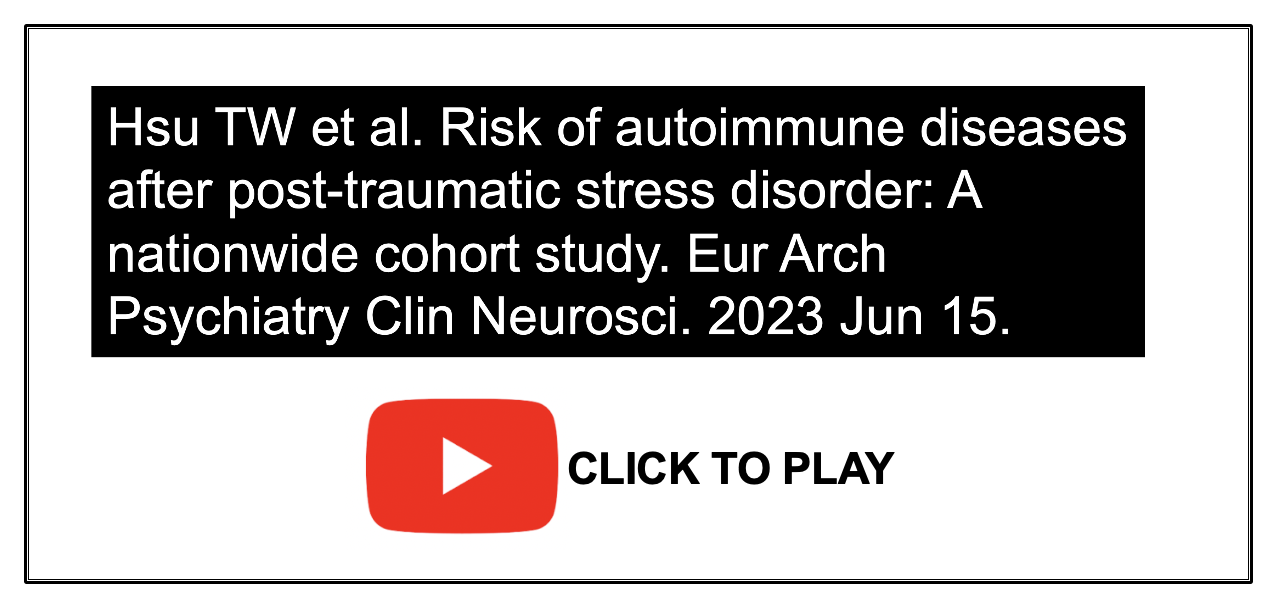Post Traumatic Stress Disorder: A Potential Trigger for Autoimmune Diseases
Patients Experiencing PTSD Have An Increased Risk to Develop Autoimmune Diseases
Posttraumatic stress disorder (PTSD) is a psychiatric disorder that may occur in people who have experienced or witnessed a traumatic event, series of events or set of circumstances. The Diagnostic and Statistical Manual has a very formal definition of PTSD and this is useful to review.
It has been estimated that PTSD will affect about 1 in 11 people during their entire lifetime. Every year it affects about 3.5 % of the US population. Accumulating evidence suggests that Post traumatic stress disorder may influence the development of autoimmune diseases.
I have been following the medical studies linking PTSD to autoimmune disease for several years now. I recently read another recently published study showing an association between PTSD and autoimmune disease.
Hsu et al 2023
This study from Taiwan set out to investigate the risk of subsequent autoimmune disease in patients with post-traumatic stress disorder (PTSD).
Between 2002 and 2009, the authors enrolled over 5000 patients with PTSD and matched them 1:4 with controls who did not have PTSD. Patients were from the National Health Insurance Database of Taiwan. Patients were then followed until December 31, 2011, or death.
The authors chose to investigate several autoimmune diseases including thyroiditis, lupus, rheumatic arthritis, inflammatory bowel disease, Sjogren's syndrome, dermatomyositis, and polymyositis.
Results
All in all, after adjusting for confounders, patients with PTSD had a 2.26-fold higher risk of developing any autoimmune disease compared to the controls. For specific autoimmune diseases, patients with PTSD had a 2.70-fold higher risk of thyroiditis, 2.95-fold higher risk of lupus, 6.32-fold higher risk of Sjogren's syndrome.
Interestingly, individuals with more severe forms of PTSD had a greater risk of developing autoimmune diseases.
For example, patients who needed to access psychiatric clinics most often had an 8.23-fold higher risk of any autoimmune diseases than the controls.
Conclusion
This study adds to our growing body of literature suggesting that patients with PTSD had an increased risk of autoimmune diseases, and such risk was associated with the severity of PTSD in a dose-dependent manner.
I really liked this study as it adds to our growing body of knowledge linking PTSD to autoimmune disease.
A 2018 study by Song et al and and a 2021 study by Dai et al are worth mentioning. These studies highlight the importance of this link. The Song et al study highlights just how much younger patients are affected and how treating PTSD may reduced the risk of developing PTSD. The Dai et al study reminds us specifically of how alopecia areata may be affected by PTSD,
STUDY 1: SONG ET AL, 2018
This was a retrospective cohort study that included 106 ,464 patients with stress-related disorders and 1 ,064, 640 matched unexposed individuals. Data showed that diagnosis of stress-related disorders was significantly associated with an increased risk of autoimmune disease. Compared with the unexposed population, patients with stress-related disorder had a 1.36 fold increased risk of developing autoimmune disease (HR, 1.36 [95% CI, 1.33-1.40]). Interestingly, the relative risk elevations were slightly more pronounced among younger patients compared to older patients. The persistent use of selective serotonin reuptake inhibitors during the first year of posttraumatic stress disorder diagnosis was associated with a reduced relative risk of autoimmune disease (HR, 3.64 [95% CI, 2.00-6.62]; 2.65 [95% CI, 1.57-4.45]; and 1.82 [95% CI, 1.09-3.02] for duration ≤179, 180-319, and ≥320 days, respectively; P for trend = .03).
STUDY 2: DAI ET AL, 2021.
I have reviewed the Dai et al study in the past.
Briefly, this was a study looking to investigate the association of PTSD with the risk of autoimmune skin diseases. The authors included 9801 patients with PTSD and 39,204 matched controls. Researchers showed a three fold increased risk of autoimmune skin diseases among the patients with PTSD. When the authors examined specific skin diseases, there were statistically significant associations were found between PTSD and several skin diseases.
Specifically, there was an association found between PTSD and lichen planus (aHR = 31.63, 95% CI = 4.00-249.91), vitiligo (aHR = 16.06, 95% CI = 4.48-57.54), autoimmune bullous diseases (aHR = 9.55, 95% CI = 1.98-45.99), alopecia areata (aHR = 4.77, 95% CI = 2.47-9.20), and psoriasis (aHR = 3.81, 95% CI = 1.90-7.67)
REFERENCES
Tien-Wei Hsu et al. Risk of autoimmune diseases after post-traumatic stress disorder: a nationwide cohort study. Eur Arch Psychiatry Clin Neurosci. 2023 Jun 15.
Song H et al. Association of Stress-Related Disorders With Subsequent Autoimmune Disease. JAMA. 2018 Jun 19;319(23):2388-2400.
Dai Y-x et al. Posttraumatic Stress Disorder and the Associated Risk of Autoimmune Skin Diseases: A Nationwide Population-Based Cohort Study. Psychosom Med . 2021 Apr 1;83(3):212-217.
This article was written by Dr. Jeff Donovan, a Canadian and US board certified dermatologist specializing exclusively in hair loss.



